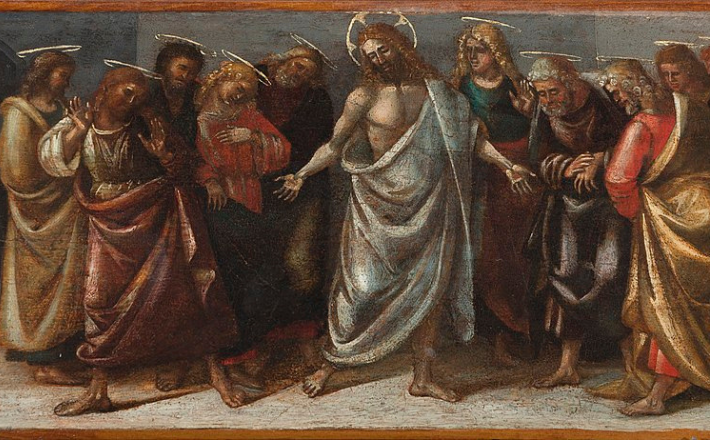Commentary on Psalm 133
Psalm 133 is 14th of the 15 “Songs of Ascents” in Book Five of the Psalter.1 These “songs” were most likely sung by pilgrims as they made their way to Jerusalem to celebrate a number of annual religious festivals, including Passover, the Feast of Weeks, and the Feast of Tabernacles.
In three short verses, the singer of Psalm 133 summarizes the goodness and pleasantness of kindred living together in unity and likens that goodness and pleasantness to two powerful metaphoric images—oil and dew. A number of scholars suggest that Psalm 133 was formed by combining a traditional proverbial or wisdom saying with worship or liturgical images from the life of ancient Israel. The proverbial saying would have gone something like this:
Behold, how very good and pleasant it is when kindred live together in
unity.
It is like the precious oil on the head,
running down upon the beard.
It is like the dew of Hermon.
And the worship additions would have been:
… on the beard of Aaron
… which falls on the mountains of Zion.
For there the LORD ordained his blessing, life forevermore.
The two simple images of oil and dew, combined with the images of oil on Aaron’s head and dew on Jerusalem, transformed the proverbial saying into a celebration of the goodness and pleasantness of pilgrims coming together in Jerusalem, God’s dwelling place.
In its proverbial setting, the wisdom words of verse 1—“How good and how pleasant”—recall the exclamation of blessing uttered by a traveler or visitor upon entering the home of another in ancient Israel. The word translated “good” is tob, a word that recalls God’s assessment of creation in Genesis 1.
In Genesis 1:4, 10, 12, 18, and 21, the creation story tells us that “God saw that it was good.” At its conclusion, “God saw everything that God had made, and indeed, it was very good” (verse 31).
In the Genesis 2 creation story, however, God declares, “It is not good [lo’ tob] for the human to be alone; I will make him a helper as his partner” (verse 18). The word “good” in Psalm 133:1 reminds the reader/hearer of God’s provision of community and relatedness for humanity.
The word translated “pleasant” in Psalm 133:1 is na’im. Its meanings include “lovely, good, attractive, friendly, joyous.” It frequently occurs in parallel to “good,” tob (Genesis 49:15; Psalm 147:1; Job 36:11; Proverbs 24:25). In ancient Israel, extended families lived together in small communities and shared responsibilities that were common to their communities.
Verse 2 compares the goodness of kindred dwelling together to the “good oil” on the head. Although the NRSV translates the word “precious,” here we have the same word, tob, that is used to describe kindred dwelling together.
Oil from the olive was an important commodity in the dry environment of the ancient Near East. Olive oil was mixed with sweet-smelling spices and used for hair and skin care. The oil was poured over the head and, for men, ran down into the beard. A basic act of hospitality when visitors entered the homes of others was to wash the visitors’ feet and pour soothing and refreshing oil upon their heads.
The oil in Psalm 133 is poured upon the head of Aaron, and the oil runs down into his beard and onto the collar of his garments. In Leviticus 8, Moses anoints his brother, Aaron, as high priest of ancient Israel. We read:
Then Moses took the anointing oil and anointed the tabernacle and all that was in it, and consecrated them. … He poured some of the anointing oil on Aaron’s head and anointed him, to consecrate him. (Leviticus 8:10, 12)
Verse 3 continues the metaphor of soothing and refreshing moisture. Mount Hermon, located some 125 miles north of Jerusalem, was known for its abundant dew. And in Palestine, which saw little rainfall between the months of April and October, dew was an important commodity. Without the nightly accumulation of dew, the land would be parched and dry for many months out of the year.
In Psalm 133, the dew that soothes and refreshes the land comes down, not on Mount Hermon, but on Mount Zion, and Jerusalem, the center of worship for ancient Israel, is soothed and refreshed.
The verse continues with words of confidence that from Zion, where the God of the ancient Israelites dwelled, the people sought and found blessing—barak. The word reverberates throughout the pages of the Hebrew Bible: God says to Abram, “In you all the families of the earth shall be blessed” (Genesis 12:3); after Jacob’s long night of wrestling, we read, “And there he blessed him” (Genesis 32:29); and Moses says to the Israelites in Deuteronomy, “Surely the LORD your God has blessed you in all your undertakings” (Deuteronomy 2:7).
The oil and the dew are metaphoric symbols of blessing that celebrate the goodness and pleasantness of those who dwell together in unity.
In its position in the book of Psalms, then, Psalm 133 is a proclamation of delight, sung by pilgrims traveling up to Jerusalem. We have here, I think, a picture of the sincere and simple pleasure of people who are bound together by their covenant with the Lord and who, having come from a great distance, anticipate with joy standing together in the courts of the temple and sitting down together at the feast table.
The ancient Israelite singers of Psalm 133 would most likely have remembered the proverbial wisdom saying upon which the psalm was based—kindred who dwell together in unity being likened to good oil and dew. They still would have celebrated the joy and goodness of dwelling together as brothers and sisters. But the words of the whole psalm reminded the people that their family relationship was established not by blood, but by their mutual share in the community of God, a community that received blessing from its God.
Psalm 133, as one of the Songs of Ascents, prepared the pilgrims coming to Jerusalem to celebrate together as family, as kindred living in oneness, the festivals of the Lord their God. The celebrations of festivals at the Temple in Jerusalem transformed pilgrims coming from different places into a family that for a holy time ate and dwelt together. Psalm 133 was a song of greeting, of anticipation, and of celebration of that holy time.
In the Christian tradition, Psalm 133 is often used as a text for the observance of the Lord’s Supper, which calls the whole people of God to a family table where all are welcome. St. Augustine boldly claimed that Psalm 133 inspired the foundation of monasteries, since its words paint a picture of the ideal of brothers, fellow pilgrims in the faith, dwelling together in unity.
We each have our own “kindredness” based on blood ties, but we also share in a covenant community with God in Jesus. We come from kindred families from different places and times, but our ultimate kindredness is assured through our mutual share in the promises of God.
Notes
- Commentary first published on this site on April 12, 2015.



April 7, 2024